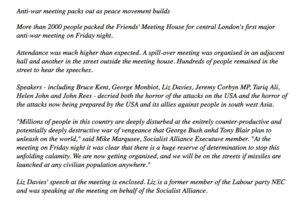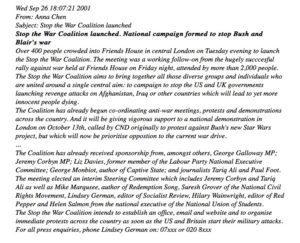Stopping the Iraq War 2001-3, from race war to 9/11: How the press was done
By Anna Chen
13 February 2023.
Wednesday 15 February marks the 20th anniversary of the unprecedented million-strong anti-Iraq War demonstration in London.
2001 was a busy year for presswork even before the September 11 attacks in the USA.
In March, we had woken up to lurid headlines splashed across the media accusing UK Chinese of starting the previous year’s Foot and Mouth Disease outbreak which had brought the British countryside to its knees, and which Prime Minister Tony Blair was still failing to bring under control.
With farmers committing suicide as their businesses went up in flames along with the pyres of dead livestock, Blair had no solution to offer other than the incineration of animals, infected or not.
And then out of the blue, every front page and broadcast news bulletin suddenly accused UK Chinese of being the cause.
This was so absurd for anyone brought up on World War 2 history and schooled in how Goebbels had scapegoated Jews by associating them with filth and pestilence, that it was difficult to take seriously at first.
Valerie Elliot of The Times had been briefed by the Northumberland branch of the Ministry of Agriculture Fisheries and Food (MAFF) that the outbreak had started in pigswill collected from food outlets including a Chinese restaurant. Without any scientific evidence whatever, the press had taken the heat off the embattled PM by accusing a minority group of a national crime. It felt so mediaeval.
There followed much speculation about Mr Big criminals smuggling bush meat and antelope hooves into the country. Unable to picture herds of wildebeest galloping across the Chinese serengetti, amusement turned to horror. It didn’t matter that Britain was enjoying cheap food and Chinese fooderies get their meat from the butchers, same as everyone else. It was an image tapping into decades of invisibility and Yellow Peril stereotypes, confirming us as a permanent reservoir of scapegoats.
One friend told me it looked like we were being set up for a pogrom.
The Chinese catering industry took a huge economic hit. Abuse of Chinese takeaway workers in remote areas had begun. Someone was going to end up getting hurt.
UK Chinese across the political spectrum joined forces to present our case. I ran the press campaign and, after the business community lobbied Downing Street, we formed a delegation to meet the MAFF minister, Nick Brown, who reiterated his anti-racist credentials and denied that his office had made the allegation.
The Chinese made history when, for the first time this model minority protested on Sunday 8 April in London’s Soho and brought Chinatown to a halt. We marched to MAFF HQ where Minister Nick Brown came out and vindicated us in front of the international media.
Relieved that we’d headed off disaster, I was able to concentrate on the next press campaign: the Socialist Alliance’s run in the summer’s General Election.
* * * *
After three years of New Labour’s betrayals of their own constituents, a danger grew that the electorate would grow so disappointed in Blair’s rightward drift that they would abandon Labour for the Far Right. The aim of the Socialist Alliance, comprising groups and independents from the British Left, was to give voters a left alternative to Labour.
As the new kids on the block, we made a positive splash in the media, fielding 98 candidates including investigative journalist Paul Foot, who didn’t win but kept his deposit. The SA was described as “fresh and exciting” by John O’Farrell in the Guardian. “Easily the best performance for the left in post-war Britain,” John Curtice told The Independent.
Mike Marqusee said I’d done the equivalent work of the six press officers who’d publicised the Countryside Alliance with a similar size operation and a proper budget.
These two successful press campaigns within a few months had given me extensive experience with a steep learning curve, but I was eager to return to my writing and performance work.
Strange how the universe trashes your most finely-tuned plans.
So, by the time we watched two airliners smash into the World Trade Centre on 11 September, I was as ready for the challenge as I could ever be.
* * * * *
President George W Bush instantly vowed to punish those responsible for the attacks which many read as a declaration of war. On whom, we didn’t yet know but Iraq was rapidly slipped in to replace Afghanistan as number one patsy.
Stop The War (STW) revived itself for the first time since Yugoslavia was dismembered by NATO, scheduling its first anti-Iraq War meeting for 21 September at Friends Meeting House opposite London’s Euston Station. With Mike Marqusee writing most of our bulletins, I issued the first of our blizzard of press releases under the Media Workers Against The War banner for STW three days before on the 18th. I had my usual media list plus 98 Socialist Alliance candidates and their branches from the summer’s General Election out of which to build a spine of resistance.
The hall was packed out. Speakers, including Bruce Kent, George Monbiot, and Jeremy Corbyn MP, “decried both the horror of the attacks on the USA and the horror of the attacks now being prepared by the USA and its allies against people in south west Asia”.
A day later on the 22nd, the Campaign for Nuclear Disarmamant (CND) held a vigil at Downing Street attended by 5,000 people.
The British public were appalled by the prospect of an all-out war with Afghanistan and, even more absurdly, Iraq. Meetings were springing up as they poured into a rapidly coalescing anti-war movement.
At the Media Workers Against The War’s founding meeting on the 23rd, John Pilger, Paul Foot, Tariq Ali and a range of left figures argued for action and issued a statement.
The following week on 26 September, STW formally launched itself as the Stop the War Coalition (STWC), later becoming a three-way partnership with the Campaign for Nuclear Disarmament (CND) and the Muslim Association of Britain (MAB).
The left were expert at holding rallies and demonstrations, but often with little to show for it beyond a nice day out. This time, to prevent our activities disappearing as yet another walk in the park, we needed a coordinated press campaign, otherwise we’d be preaching to the choir.
With an expanding anti-war campaign, I expected to be working alongside other press officers, in particular veterans from CND. Instead, my emails went unanswered and all attempts to speak to them failed. CND went AWOL. On 27 October, I emailed the STWC convenor asking for back-up to help me with the media work but answer there came none. This left me doing all the national presswork on my own while Marqusee continued to write the STWC releases.
I continued to publicise the plethora of activities springing up from a galvanised base such as anti-war pickets at the BBC, a MWAW newsletter, coalition benefits featuring plays by Caryl Churchill and Tony Kushner, while encouraging rapid rebuttal activity, building fact files and in constant phone communication with news editors.
It was all hands on deck and, once STWC provided a focal point, everyone joined in. I scored a victory when, after years of under-reporting protest attendance numbers and ignoring our complaints, the BBC’s Head of News Richard Sambrook finally wrote to me admitting as much: “The relevant pages on BBC News Online were also updated. I accept we ought to have known your higher figure a little earlier.”
Unfortunately, the STW barely tolerated my presswork with many of them telling me not to do it because “it’s the bourgeois press, they ignore us and we don’t engage with them”. This was difficult to understand as my presswork was propelling the STWC convenor, Jeremy Corbyn MP and the burgeoning anti-war movement out of the shadows and into the public eye.
However, over the next two years, I worked from home, publicising our activities which included a series of show-stopping anti-Iraq War demonstrations in London. Each protest was bigger than the last with an estimated 50-100 thousand in attendance, exposing BBC reports of 10-15,000 as absurd. On one demo, I stood outside the National Gallery and watched Trafalgar Square filled to bursting while the march was still coming down Haymarket with no end in sight.
Eventually, once something was up for grabs, STWC got some sort of press action running but which Andrew Burgin, latterly a press officer, confessed wasn’t up to scratch: “We badly need good press officers,” he told me the weekend prior to the Mother Of All Demos.
This was on the “Football Match for Peace”, a local event which the Islington organisers had asked me to publicise and which I managed to turn into an international news warm-up for the Big Day. Tony Blair’s sister-in-law Lauren Booth cheered us up with her presence. Bianca Jagger kicked off the match between Americans Against the War (AAW) and a team of Iraqi students. And Andrew Murray gave a speech.
Everyone seemed delighted.
But no good deed goes unpunished.
The following weekend, on Saturday 15 February 2003, I found myself banned from the climactic march and rally by a sectarian leadership and stymied by a rising anti-east Asian bias. I confined myself to getting an ITN news crew to follow and film Bianca Jagger and the AAW’s Gabriel Furshong at the demo.
From across the nation, the huge numbers marching to the Hyde Park rally were breathtaking — over a million and quite possibly getting on for a million and a half. The biggest protest in the UK had been built by the rank and file and all without corporate money. My mood was only knocked when LibDem leader Charles Kennedy stated from the platform that he’d be supporting our boys once the war started.
There was one more key date to deal with: the actual Parliamentary vote on 18 March. Surely we’d have a reasonable turnout in Westminster to remind the Labour MPs who’d promised to vote against Blair’s war that their’s would be the people’s choice.
It was disappointing to see STWC demobilise for this crucial date. Cui bono?
Tony Blair won the war vote and, two years and hundreds of thousands of Iraqi citizens’ lives later, Bush declared his Shock and Awe victory in 2005. Standing in the rubble of Iraq, Dubbya came out with what initially sounded like a non-sequitur: he designated China to be a strategic competitor.
How was this possible? In 2005 China was still a relatively poor country with its workers slaving away in suicide factories making our goods. Having been all but destroyed when Britain forced industrial mass produced opium on China at gunpoint in the 19th century Opium Wars, and during imperial Japan’s savage occupation and the West’s Korean war, why was America intent on waging another war, this time on the most populous country in the world just as it was getting up off its knees?
It was at this point that I saw a long line of boxes being ticked off, beginning with Yugoslavia via Iran, Iraq, Libya, Syria, Afghanistan and ending with Russia and China.
And then I learnt that Bush Junior had first targeted China years earlier in his 2000 election campaign, calling China a strategic competitor.
So, only months before Tony Blair’s administration had deflected hate, horror and disgust onto British Chinese who’d never done him any harm, we were already in the cross-hairs. Blair had thrown us under a bus to take the heat off himself and prove his loyalty to the new Rome. He would end up being tipped around £2 million a year by JP Morgan which had been granted pole position as the bank coordinating the extraction of wealth from a ravaged Iraq.
Which brings us full circle to the USA’s current go-for-broke policy as the supposedly abandoned Project for the New American Century goes nuclear and the UK, the second biggest force in NATO, nails us to the USS Titanic.
Thinking back to the confidence on display in the early days of the anti-war movement in 2001-2003, I’ve been wondering why there has been so little push-back from the British Left since then over Libya, Syria and Ukraine and while vicious Yellow Peril narratives set like concrete.
Our current rush to war with the rising superpower, losing us our cheap energy, mass produced goods and food, has gone largely unopposed. Where has the peace movement been in the past few years? Facing nuclear oblivion, the left has only just started to hold peace demonstrations and rallies, but virtually nothing about China.
Let’s hope those accusations against the Chinese during the Foot and Mouth Disease outbreak of 2000-2001 weren’t a practise run for the Mother of All Dodgy Dossiers and World War III.
FURTHER READING:
Shakedown: America’s 21st Century War on China More than 20 years of keeping tabs on the incessant crawl of US imperialism since George W Bush declared China to be a strategic competitor in 2000.


